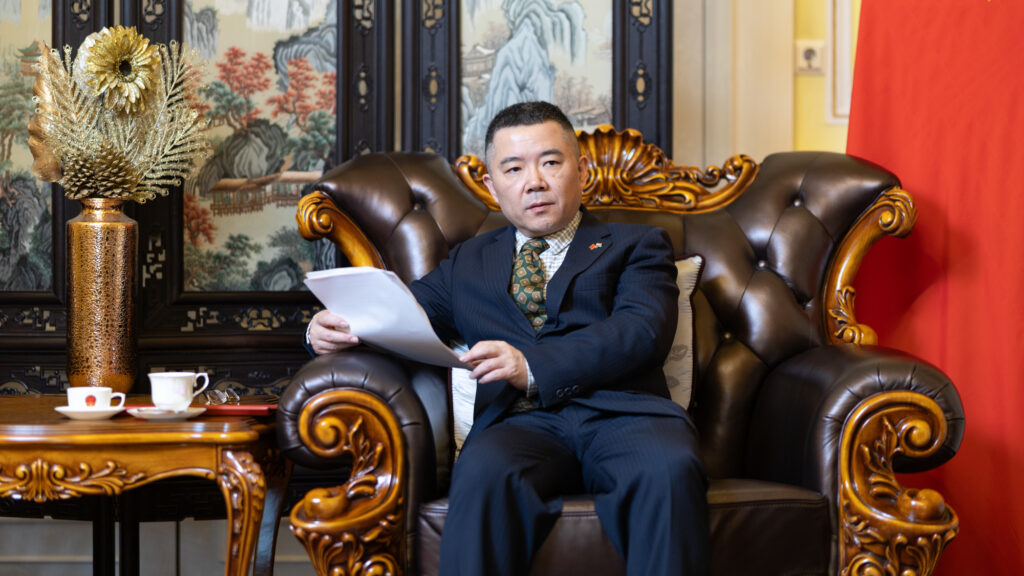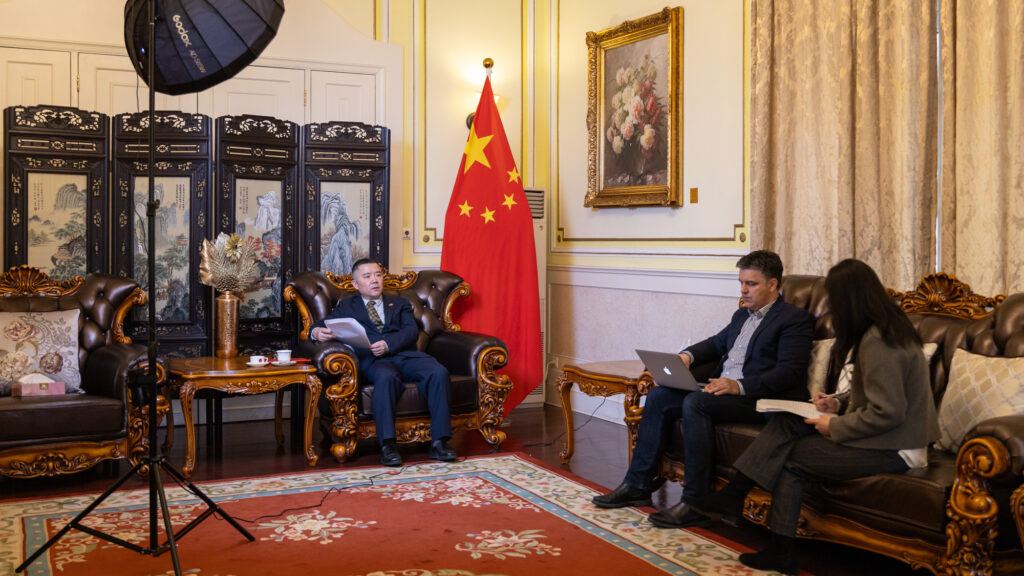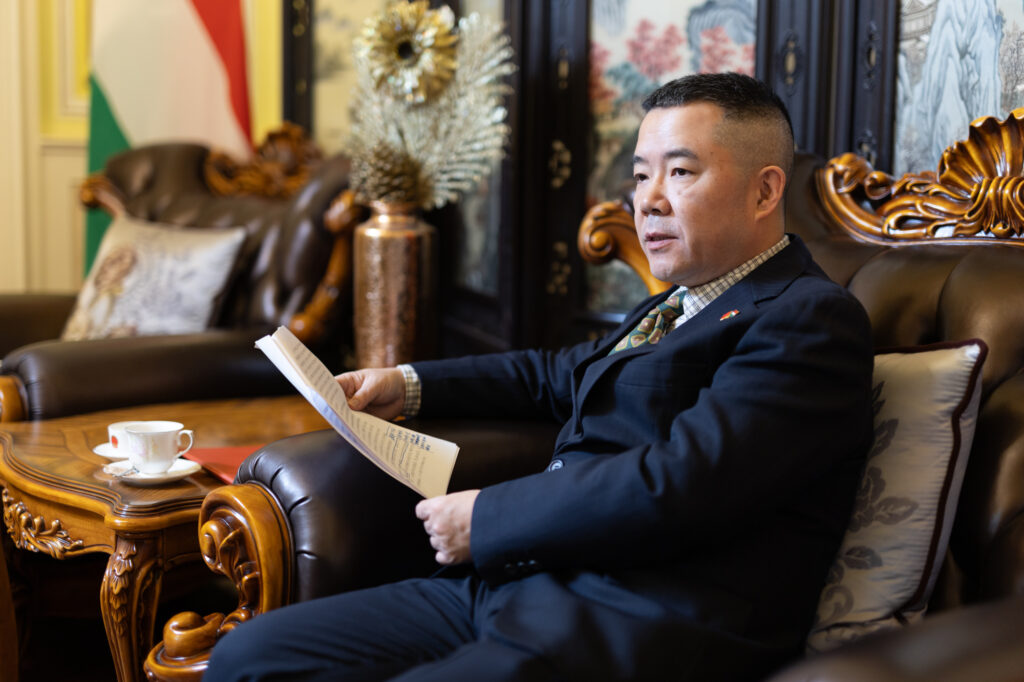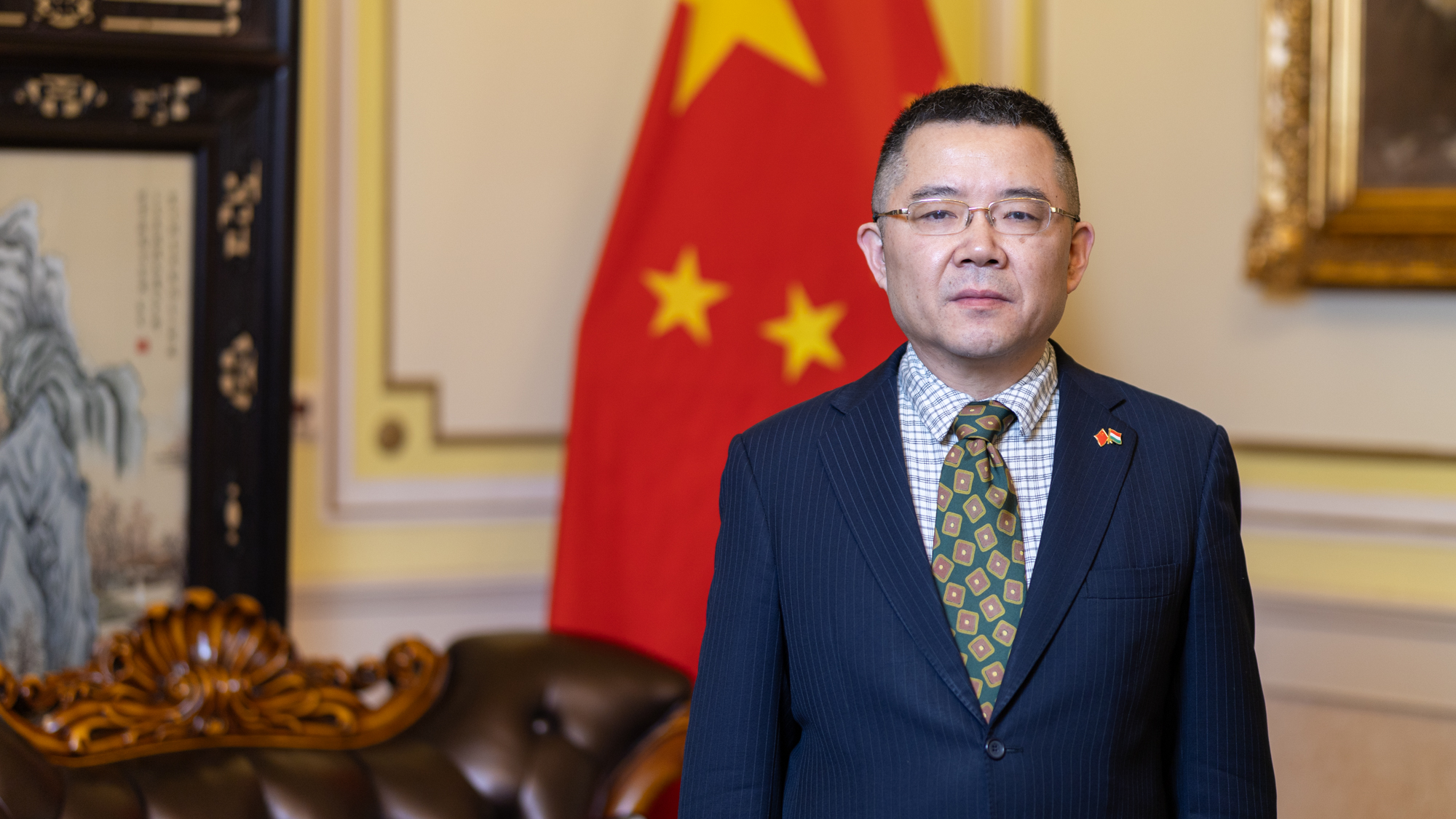Gong Tao has been serving as the Ambassador Extraordinary and Plenipotentiary of the People’s Republic of China to Hungary since September 2023, after succeeding Qi Dayu. As a seasoned diplomat, Ambassador Gong has played a key role in strengthening Sino–Hungarian relations, particularly through initiatives like the Belt and Road Initiative and Hungary’s Eastern Opening policy. His tenure has focused on enhancing political mutual trust, fostering high-quality economic cooperation, and promoting cultural exchanges between the two countries.
***
There is a full-scale tariff war between the US and China. US tariffs on Chinese-made goods jumped from 10 per cent to 145 per cent. How does it affect the Chinese economy, the Chinese companies? And how does China want to counterbalance the American actions?
China’s position on tariffs has been consistent: prohibitive tariffs do no good to China, the US and the world at large. The US impositions of heavy tariffs on all major trading partners, including China, defy the fundamental laws of economics and trade principles, disrupt the world economic order, and stand in the way of global economic recovery.
In the short term, while Chinese exports to the US will inevitably be affected, tariffs are not a single-edged sword. Currently, the US remains China’s largest export destination and second-largest source of imports. In 2024 China’s exports to and imports from the US accounted for 14.7 per cent and 6.3 per cent of China’s total exports and imports, respectively. Meanwhile, China is the third-largest export destination and second-largest import source for the US, with US exports to and imports from China representing 7.0 per cent and 13.8 per cent of total US exports and imports in 2024, respectively.
Having developed close economic ties in the process of globalization, the two countries have become interdependent trading partners that both benefit from their relationship—a win-win balance that prohibitive tariffs will unavoidably tip. But in the long term, China’s steady economic growth momentum and commitment to high-standard opening up remain unchanged.
First, China’s economic fundamentals are strong. For 15 consecutive years, China has maintained its position as the world’s largest manufacturer, developing a comprehensive industrial system and a solid economic foundation. With a 1.4 billion-strong population, a middle-income group of 400 million people, and a per capita GDP exceeding 13,000 US dollars, China is the world’s second-largest consumer market and largest e-commerce market. Its vast potential for both investment and consumption will continue to drive sustainable growth.
‘The US impositions of heavy tariffs on all major trading partners, including China, defy the fundamental laws of economics and trade principles’
Second, China’s foreign trade exhibits resilience. China is committed to high-standard opening up and is now a major trading partner for over 150 countries and regions. Despite external headwinds, China’s goods trade in the first quarter of 2025 reached 10.3 trillion yuan, an increase of 1.3 per cent year-on-year, with exports growing by 6.9 per cent. Its reliance on the US market has decreased, with exports to the US dropping from 19.2 per cent of total exports in 2018 to 14.7 per cent in 2024.
Is boosting domestic demand and spending a part of the plan?
China’s domestic demand holds immense potential. Over the past five years, China’s domestic demand has contributed an average of over 80 per cent to its economic growth as the primary driving force. China prioritizes domestic demand.
China will be implementing more proactive and effective macro policies, including the special action plan for boosting consumption, the consumer goods trade-in programme and the Shopping in China programme at the 5th China International Consumer Products Expo, whose effects are already kicking in. In the first quarter of 2025, total retail sales of consumer goods reached 12.5 trillion yuan, an increase of 4.6 per cent year-on-year, accelerating by 1.1 percentage points from 2023. Notably, China’s household consumption rate stands at around 40 per cent, well below the 70 per cent of high-income economies and the global average of 56 per cent. Each one percentage-point increase in China’s household consumption rate could unlock an incremental one trillion yuan in market demand, which is definitely a source of confidence in China’s economic growth and long-term development prospects.

‘The ball is in China’s court: China needs to make a deal with us, we don’t have to make a deal with them,’ President Donald Trump said in a statement. What agreement can be a realistic compromise between China and the US?
First, the ball is not in China’s court but in the court of the US. While China and the US have not engaged in formal consultations or negotiations on tariffs, China remains open to dialogue. Unilateral tariff hikes were initiated by the US, and it takes the doer to undo them. If the US is genuine in seeking a solution through dialogue and negotiation, it must cease threats and coercion and engage with China on the basis of equality, mutual respect, and reciprocity.
Second, ‘might makes right’ is not the reality, and legitimate rights and interests cannot be compromised. What the US needs is not forced concessions but a clear-eyed return to rationality. There is no winner in trade and tariff wars, no way forward by protectionism, and no prosperity to be achieved through decoupling. According to JP Morgan’s estimates, US tariffs, once in full swing, would slash US GDP growth from 1.3 per cent to 0.3 per cent; if tariffs persisted through September, the probability of a US recession would rise to 60 per cent.
Moreover, as noted by INSEAD, US tariffs have ‘catalysed the formation of new trade blocs and sped up regional integration’ exemplified by the recent high-level economic talks between China, Japan, and the ROK—the first in five years. The Financial Times warns that the world economy is facing huge downside risks: ‘brutal decoupling of the superpowers’ and ‘severe loss of confidence in US trustworthiness’. Even the US’s hardline stance shows signs of shifting. Confronted with realities that diverge sharply from its assumptions, the US—as the world’s largest economy—must choose rationality over recklessness.
‘What the US needs is not forced concessions but a clear-eyed return to rationality’
Where can China find new markets for its products?
To address this question, we must first ask another: Can the US find viable alternatives to Chinese products?
Chinese products hold irreplaceable competitiveness in global trade. American consumers need Chinese goods. E-commerce platforms like Shein, Temu, and DHgate—which surged in popularity after the US tariff announcement—are now attracting growing numbers of American shoppers. American businesses also rely on Chinese products. US tariff hikes hit not only trade partners but also American companies embedded in global supply chains. The policy triggered such a strong backlash from American industries that the US on 12 April exempted Chinese smartphones, semiconductors, and solar products from their ‘reciprocal tariffs’.
On top of that, China’s efforts to diversify its trade partnerships have yielded notable results. Nearly 70 per cent of the world’s economies now trade more with China than with the US. Despite external pressures, China’s foreign trade achieved growth in both scale and quality in the first quarter of 2025. According to China’s General Administration of Customs, China’s total goods trade reached 10.3 trillion yuan in that period, marking a 1.3 per cent year-on-year increase; exports rose by 6.9 per cent to 6.13 trillion yuan. In the same quarter, trade with Belt and Road partner countries increased by 2.2 per cent to 5.26 trillion yuan, outperforming China’s overall growth in trade by 0.9 percentage points and accounting for 51.1 per cent of the total. Exports to ASEAN surged by 7.1 per cent to 1.71 trillion yuan.

China’s vision, according to Western experts, is securing economic strength (strong exports and a protected domestic market), social stability, and technological growth that leads to regional domination, with the goal of becoming a world power in a new world order (alongside a declining American hegemony). Increasing diplomatic-political influence on the world stage and a strong military will finally result in a new dominant state globally. What are the main goals of the Chinese foreign policy?
The mission of China’s foreign policy has always been to safeguard world peace and promote common development, with a vision of building a community with a shared future for mankind. China follows an independent foreign policy of peace, determining its positions and policies based on the merits of each issue. China upholds the fundamental norms of international relations and international fairness and justice, while opposing hegemonism and power politics in all their forms, the Cold War mentality, interference in other countries’ internal affairs and double standards. China will never seek hegemony or engage in expansion.
‘Nearly 70 per cent of the world’s economies now trade more with China than with the US. Despite external pressures, China’s foreign trade achieved growth’
China is committed to a win-win strategy of opening up, providing new opportunities for the world through its own development and delivering benefits to more peoples by pursuing an open world economy. As a champion of globalization, China is committed to advancing liberalization and facilitation of trade and investment, bilateral, regional and multilateral cooperation, and international macroeconomic policy coordination. It is working ceaselessly to create an enabling international environment for development, cultivate new global growth drivers, fend off protectionism, reject barriers and decoupling, and push back against unilateral sanctions and extreme pressure.
China’s millennia of historical wisdom teach that hegemony leads inexorably to decline—a stark contrast to the misguided belief that a strong nation is fated to pursue domination. China advocates for an equal and orderly multipolar world and a universally beneficial and inclusive economic globalization. It has proposed the Global Development Initiative, the Global Security Initiative, and the Global Civilization Initiative, which are seen as new pathways to building an open, inclusive, clean and beautiful world of lasting peace, universal security and shared prosperity, and new contributions to human progress.
What is the significance of China’s neighbourhood diplomacy?
Recently, I was back in Beijing for the Central Conference on Work Related to Neighboring Countries, where I had the privilege of listening to President Xi Jinping’s important instruction on China’s neighbourhood work. Following the meeting, as this year’s first presidential trip abroad, President Xi Jinping paid a visit to Vietnam, Malaysia, and Cambodia upon invitation, which in itself speaks to the critical role of neighbouring countries in China’s foreign policy.
‘China will never seek hegemony or engage in expansion’
China’s vast territory and long borders make its neighbourhood a vital foundation for achieving development and prosperity, a key front for safeguarding national security, a priority area in managing overall diplomacy, and a crucial link in promoting the building of a community with a shared future for mankind. China acts on the principle of amity, sincerity, mutual benefit, and inclusiveness in neighbourhood diplomacy, and advocates for the building of a community with a shared future with neighbouring countries. Guided by head-of-state diplomacy, China has worked with neighbouring countries to deepen all-around cooperation, reaching consensus on building communities with a shared future with 17 neighbours, signing Belt and Road cooperation agreements with 25 neighbours, and becoming the largest trading partner for 18 of them. Political mutual trust and converging interests between China and its neighbours continue to deepen.
The Belt and Road Initiative originated in and delivers benefits to the neighbourhood. Railways now connect over 100 cities across 11 Asian countries, with the China–Laos Railway and Jakarta–Bandung high-speed railway empowering regional connectivity after their completion. Major projects such as the China–Central Asia Gas Pipeline and the China–Pakistan Economic Corridor have significantly boosted regional economic growth and brought improvements to people’s lives.
In a region densely populated by Global South countries, China has been working to improve regional cooperation mechanisms in more creative ways. China actively promotes collaboration under such frameworks as the Shanghai Cooperation Organization (SCO) and Asia–Pacific Economic Cooperation (APEC), initiated platforms such as the China–Central Asia Summit and Lancang–Mekong Cooperation, and hosted the Conference on Dialogue of Asian Civilizations, as part of its effort to institute multilayered, cross-domain cooperation platforms, and practice true multilateralism with all its neighbors.
‘China advocates for an equal and orderly multipolar world and a universally beneficial and inclusive economic globalization’
Connectivity is the main Hungarian policy aimed at maintaining good relations—primarily for economic reasons—with all the blocs in global politics. Does this align with the Chinese strategy? Does this Hungarian ‘neutrality’ help with doing business here in Hungary?
Hungary and China share close bonds, and our enduring cooperation transcends geographical boundaries. Hungary follows the Eastern Opening policy, which dovetails with China’s Belt and Road Initiative and underscores ties with Asian countries. Hungary has shown strong support for our infrastructure connectivity represented by the China–Europe Railway Express and the Budapest–Belgrade Railway as a flagship project of the China–Europe Land–Sea Express route, for the institutional connectivity of Asia–Europe industrial and supply chain integration, and to people-to-people connectivity embodied in cultural exchanges through institutions like the Hungarian–Chinese Bilingual School and Hungarian Cultural Centres. Hungary is truly a bridge between the Asian and European continents.

China’s second biggest export market is the EU. Is this the main reason why Hungary is important to China—a gateway to the EU?
The European Union is home to 27 member states across an expansive Europe. China sees each country, including Hungary, as a vital bridge in China–EU cooperation. The friendship and cooperation between China and Hungary are deeply valued by China. The two countries enjoy strong political mutual trust and carry out fruitful cooperation across various fields, setting an example of a new type of international relations.
Hungary was among the first countries to establish diplomatic ties with the People’s Republic of China. Over the past 75 years, China–Hungary relations have withstood the test of shifting global dynamics, remaining rock-solid and growing ever stronger. In 2024, as the two countries celebrated the 75th anniversary of diplomatic relations, President Xi Jinping paid a historic state visit to Hungary. Leaders of our countries elevated the relationship to an all-weather, comprehensive strategic partnership for the new era, steering cooperation onto a Golden Voyage. This friendship has also borne fruit in practical cooperation. In 2024 China once again became Hungary’s largest source of foreign investment and its biggest trading partner outside the EU. Chinese direct investment in Hungary reached 5.28 billion euros, accounting for 51 per cent of Hungary’s FDI, while bilateral trade exceeded 16 billion US dollars.
Hungary stands proud in Europe as a nation of unique influence and independence. Regardless of the change in the international landscape, it has always followed a friendly policy toward China. Pursuing its Eastern Opening strategy and economic neutrality, Hungary is committed to enhancing connectivity as a place where the East meets the West. It was the first European country to sign a Belt and Road cooperation agreement with China. As practical collaboration deepens, Hungary has emerged as a pivotal node for Belt and Road cooperation and a critical hub for Chinese goods entering the European market.
‘Regardless of the change in the international landscape, Hungary has always followed a friendly policy toward China’
The EU and the US criticize Hungary for its friendly relations with China. They consider China a trade partner but a threat too. How do you see this conflict?
Mutual respect is a basic norm governing state-to-state relations. It is also an important prerequisite for China’s relations with Hungary, the EU and the US. No country should fantasize that it can suppress China, and maintain good relations with China at the same time. Such two-faced acts are not good for the stability of bilateral relations or for building mutual trust.
China has consistently pursued friendly relations with all nations on the basis of mutual respect and equality, attaching no political strings to cooperation, and refraining from interfering in other countries’ internal affairs. Whether in China–Hungary collaboration or partnerships with other European states, our cooperation targets no third party and remains impervious to such influence. As Foreign Minister Péter Szijjártó unequivocally stated, Hungary opposes decoupling, and perceiving China as a threat forfeits opportunities while embracing it as a partner is the wise choice. I am confident that China–Hungary relations will remain resilient against external noise.
This year marks the 50th anniversary of diplomatic relations between China and the EU. China–EU cooperation has come a long way over the past decades, gaining greater strategic significance and global impact. A healthy, stable China–EU relationship benefits not only the two sides but also the world. Earlier this year, President Xi Jinping emphasized in his phone call with President António Costa of the European Council that the more severe and complex the international situation becomes, the more China and the EU should keep in sight why we established diplomatic relations in the first place, strengthen strategic communication, enhance strategic mutual trust, and see each other as partners. China remains confident in the EU and hopes the EU will also prove to be a trustworthy cooperation partner for China.
At the same time, China opposes attempts to turn business relations into political, ideological or security issues, as well as actions that undermine international trade rules and destabilize global industrial and supply chains. I believe that China and the EU possess the capability and wisdom to resolve differences through friendly consultations, and that we will usher in another promising 50 years together.
Related articles:







